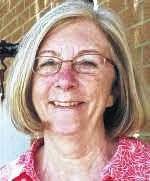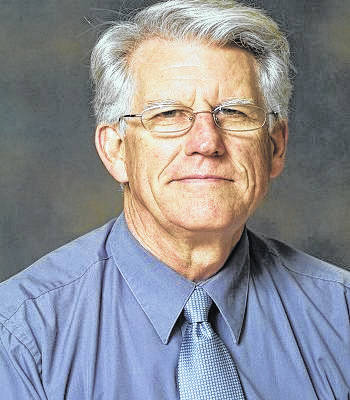LAURINBURG — Larry Shultz and Shannon Newton, both with the Scotland County Cooperative Extension, told the Laurinburg Rotary of the history of horticulture development and the programs the extension offers.
“In the 1800s there was no way to share tips and information on growing crops,” said Newton. “Everything was passed along by word of mouth. So, in 1862 land grant universities were created. The government gave the states a piece of land to sell to raise the money for their universities.
“These universities focused on agriculture science, military tactics and engineering,” continued Newton. “In 1890 they began developing black colleges and in 1994 some states started colleges for tribes.”
As she continued, Newton said in 1914, “Corn Clubs” were created.
“Sons were given a piece of their father’s land to plant crops to use the new methods of growing,” said Newton. This helped spread the information to other farmers and those with the best crops were awarded for their efforts.”
In 1973 King County, Washington, started the extension program and Scotland County started its first official office in 2017.
“These programs focus on sharing the art and science of gardening,” said Newton “There are currently 4,000 volunteers in North Carolina and 95,000 nationwide.”
“All of our volunteers are considered as staff of the Cooperative Extension and are representatives of NC State University as well as Scotland County,” Newton continued. “We all share the love of horticulture.”
There is an upcoming Master Gardener class that will be held on March 4 for those wishing to become a volunteer.
“We are also starting a program for Jr. Master Gardeners,” said Newton. “We will teach them about plants, both flowers and vegetables.”
All volunteers are trained through NC State University. Once a volunteer, they must continue with 10 hours of education and 40 hours of volunteer work per year.
“We offer the 40 hours of training, interactive hands-on workshops and field trips,” said Newton. “If anyone is interested in more information or in becoming a Master Gardner please do not hesitate to call the office at 910-277-2422.”
When it was his turn to address the group, Schultz said gardening has been part of his life for a very long time.
“I have been interested in gardening for 50 years, or maybe even longer than that,” said Shultz. “Even when I was 10 years old with my tomato stand when I lived in Oregon. There was something about those tomatoes being grown in my garden that made them taste so much sweeter.
“Horticulture is a good counterpart to my career,” continued Schultz. “Being involved in Political Science can sometimes be a frustrating treacherous journey and gardening tends to calm me. The plants offer solace.”
Schultz got involved in the Horticulture of Scotland County in 2008.
“We are currently working on a beautification project with the city on the corner of Atkinson Street and Roper Street,” Schultz said.
One of the Rotary members asked Shultz and Newton when was a good time to begin planting their crops.
“I am actually about to start planting some of my seeds,” said Schultz. “I will be planting spinach, lettuce and peas. Even with the cool air, they should be fine, however, it is good to keep an eye out for extremely cold nights. I have been known to run out late at night and cover my seedlings with a sheet.
“Around mid-May and early June I will begin with my summer plants such as squash and peppers,” continued Newton. “If you will be growing tomatoes from seeds it is good to start those now, but keep them inside and slowly introduce them to the outside weather. By April 15 tomato plants should be going in the ground.”
JJ Melton can be reached at [email protected]. To support the Laurinburg Exchange, subscribe here: https://laurinburgexch.wpenginepowered.com/subscribe.


